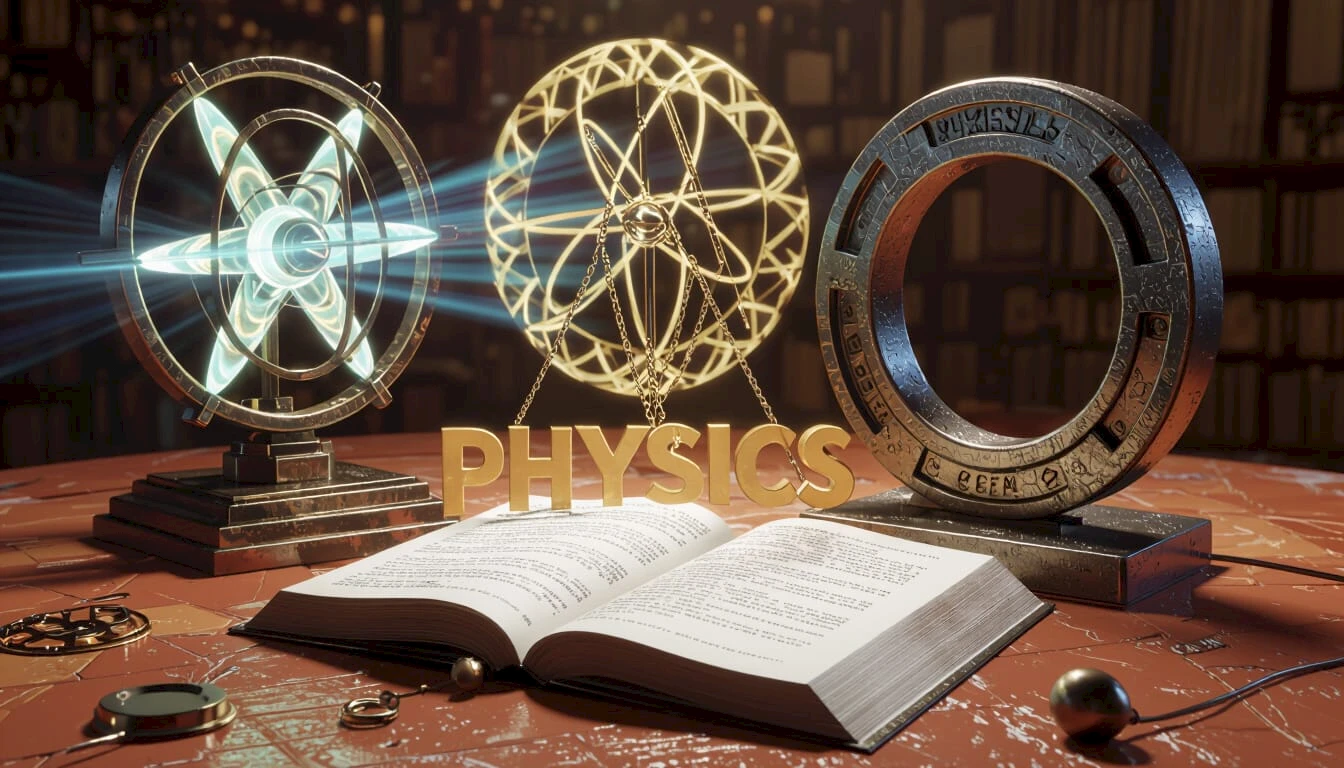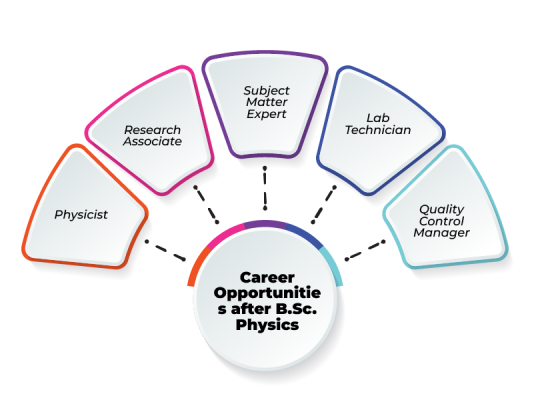B.Sc. Physics Subjects: Designed for the Next Generation of Scientists

Blog / June 24, 2025
B.Sc. Physics Year-Wise SubjectsB.Sc. Physics and afterScope of B.Sc. in PhysicsPhysics is all around us - Yes, it’s true! The light that helps us see anything, the earth's rotation that causes day-night and changes in seasons on our planet, the gravitational force working around us, and the small atoms because of which everything is made!
But Physics is not just about equations on a board. It’s all about curiosity, creativity, and building the scientific foundation behind many technologies and innovations. The B.Sc. Physics subjects in 2025 are designed to match the needs of a future driven by scientific advancement.
In this blog, you will learn about what this program covers - how it prepares you, what subjects you’ll study, and why the syllabus is now more relevant than ever, for tomorrow’s scientists like you.

Understanding the B.Sc. Physics Program
Gain a deep knowledge of the laws of nature and matter by pursuing the B.Sc. in Physics. This undergraduate program lasts three years which provides foundational understanding of the fundamental principles of physics in both theoretical and practical aspects.
Who Should Pursue a B.Sc. in Physics?
This program is ideal for:
- Curious minds who love solving problems
- Students fascinated by scientific phenomena
- Learners who love both mathematics and experiments, and
- Research, technology, or innovation-based careers
If you find satisfaction in exploring why things happen, B.Sc. Physics subjects will keep you engaged and challenged.
Eligibility Criteria for B.Sc. Physics Admission 2025
Before you dive into this exciting field, you’ll need to check if you meet the eligibility criteria:
|
Aspects |
Details |
|
Educational Qualification |
10+2 with Physics, Chemistry, and Mathematics (PCM) as core subjects. |
|
Minimum Marks |
Some universities require a minimum of 50–75% aggregate marks. |
|
Entrance Exams |
Many universities conduct entrance tests; others admit students based on merit. |
B.Sc. Physics Year-Wise Syllabus
Physics is a broad and a fascinating field, and your coursework will reflect this diversity. Here’s how the B.Sc. Physics syllabus looks:
1st Year B.Sc. Physics Syllabus Breakdown
In the first year, you will focus on building a strong foundation in the basics.
|
Semester 1 Subjects |
Semester 2 Subjects |
|
PHY 103 Fundamentals of Physics - I |
PHY 104 Fundamentals of Physics - II |
|
PHY 105 Introduction to Computational Physics -I |
PHY 106 Introduction to Computational Physics – II |
|
MAT 101 Calculus - I |
MAT 102 Calculus - II |
|
CHY 111 Chemical Principles |
UWE- University Wide Electives |
|
CCC/ UWE- Common Core/ Elective |
UWE- University Wide Electives |
|
CCC- Common Core Course |
CCC- Common Core Course |
2nd Year B.Sc. Physics Subjects Breakdown
In the second year, you will move forward to more complex topics.
|
Semester 3 Subjects |
Semester 4 Subjects |
|
PHY 201 Fundamentals of Thermal Physics |
PHY 202 Introduction to Quantum Mechanics |
|
PHY 203 Introduction to Mathematical Physics - I |
PHY 204 Introduction to Mathematical Physics-II |
|
PHY 205 Waves and Oscillations |
PHY 206 Electronics - I |
|
UWE- University Wide Electives |
PHY 208 Advanced Experimental Physics - I |
|
UWE- University Wide Electives |
CCC/ UWE- Common Core/ Elective |
|
CCC- Common Core Course |
CCC- Common Core Course |
3rd Year B.Sc. Physics Syllabus Breakdown
The third year deepens your understanding of both theoretical and applied physics.
|
Semester 5 Subjects |
Semester 6 Subjects |
|
PHY 301 Classical Mechanics |
PHY 302 Statistical Physics |
|
PHY 303 Classical Electrodynamics |
PHY 304 Condensed Matter Physics |
|
PHY 305 Quantum Mechanics - I |
PHY 306 Quantum Mechanics - II |
|
PHY 307 Electronics - II |
PHY 308 Advanced Experimental Physics - II |
|
UWE- University Wide Electives |
UWE- University Wide Electives |
|
CCC- Common Core Course |
CCC- Common Core Course |
4th Year B.Sc. Physics Subjects Breakdown
In universities following a 4-year (Honors with Research) model, your final year is focused on research and advanced electives.
|
Semester 7 Subjects |
Semester 8 Subjects |
|
PHY 4XX/5XX Physics Electives |
PHY 4XX/5XX Physics Electives |
|
PHY 4XX/5XX Physics Electives |
PHY 4XX/5XX Physics Electives |
|
PHY 499 Undergraduate Thesis |
PHY 499 Undergraduate Thesis |
B.Sc. Physics Electives Syllabus
Electives allow you to explore specialized topics of interest. Below mentioning some core electives:
|
Elective |
What You Will Study? |
|
Introduction to Biophysics |
Understand Physical aspects of various biological systems and processes. |
|
Classical Theory of Fields |
Classical electrodynamics as a field theory and general theory of relativity. |
|
Advanced Quantum Mechanics |
* Relativistic quantum mechanics that includes Dirac equation * Introduction to quantum electrodynamics. |
|
Advanced Condensed Matter Physics |
Special properties of solids: magnetism, super fluidity and superconductivity, dielectrics and ferroelectrics. |
|
Quantum Field Theory |
|
|
Introduction to High Energy Particle Physics |
|
|
Classical Field Theory and General Relativity |
|
|
Introduction to Experimental Techniques to Particle Physics |
|
|
General Theory of Relativity |
|
|
Computational and Numerical Analysis |
|
|
Non-Linear Dynamics |
|
|
Introduction to Cosmology |
|
|
Nanomaterials and Nanophysics |
|
|
Advanced Statistical Physics |
|
You can choose electives based on your career goals or research interests.
Physics Common Core Courses
Throughout the program, certain core courses ensure that you gain a strong grasp of physics concepts:
CCC: Astronomy for Amateurs
CCC: Energy Storage Systems
CCC: Early History of the Universe: The First Three Minutes
CCC: Visible and invisible light waves: How they have changed our modern life
CCC: Atmospheric Aerosols & Climate
CCC: Science, Engineering, and the Modern World
CCC: Energy for a Sustainable Future
CCC: Uses of Energy in Our Daily Life
CCC: Physical Laws: From Non-living to Living
CCC: Demystifying the Strange Quantum World for the Layman
These CCCs help you build transferable skills for both academia and industry.
Learning Outcomes of B.Sc. Physics Program
By the time you graduate, you will gain the following learning outcomes:
- A deep understanding of core physics principles and modern scientific developments
- Gain proficiency in mathematical tools and computational techniques used in physics
- Acquire strong experimental skills through advanced laboratory work
- Learn to apply physics concepts to solve real-world problems
- Build effective communication, teamwork, and project management abilities, and
- Develop an ethical and global perspective on scientific inquiry
Career Opportunities after B.Sc. Physics
A B.Sc. Physics degree opens up a wide array of career paths for students:
|
Job Roles |
Salary Range |
|
Physicist |
INR 7-12 LPA |
|
Research Associate |
INR 4-7 LPA |
|
Subject Matter Expert |
INR 4-9 LPA |
|
Lab Technician |
INR 3-7 LPA |
|
Quality Control Manager |
INR 8-16 LPA |
Many graduates also pursue research careers by enrolling in Ph.D. programs.
Ready to Become a Next-Generation Physicist? Apply for B.Sc. Physics at Shiv Nadar University (Institution of Eminence)
If you want to become a next-generation physicist, you have to find the right university that provides you a strong education in Physics, gain practical experience, and develop skills. The School of Natural Science at Shiv Nadar University offers an exceptional B.Sc. Physics program that equips students with the knowledge and skills required for a successful career.
What makes Shiv Nadar University the Right Choice?
- Interdisciplinary and future-ready curriculum
- Comprehensive B.Sc. physics subjects coverage
- State-of-the-art lab infrastructure
- Hands-on learning approach
- Expert faculty from India’s and world’s top institutions
- Industry and global relevance, and
- Scholarships and financial aid to students
Apply now for B.Sc. Physics and start your journey toward becoming a next-generation physicist.
Conclusion
A B.Sc. in Physics is not just about learning formulae and theories - it’s about developing a scientific mindset, gaining practical skills, and contributing to the advancement of human knowledge.
With a future-ready curriculum, modern labs, and exciting research opportunities, the B.Sc. Physics subjects are designed to equip you for success in both academia and industry. If you’re curious, and eager to make an impact, this program could be your perfect start.
FAQs
Q1. What are the core B.Sc. Physics subjects?
The core subjects of B.Sc. Physics program include Fundamentals of Physics, Computational Physics, Chemical Principles, Fundamentals of Thermal Physics, Mathematical Physics, Quantum Mechanics, Condensed Matter Physics, etc.
Q2. What is the focus of the 1st year B.Sc. Physics syllabus?
The 1st year B.Sc. Physics syllabus focuses on foundational concepts like Mechanics, Mathematical Physics, and chemical principles.
Q3. Is there a 4th year in B.Sc. Physics?
Some universities offer an optional 4th year (Honors with Research), where you focus on advanced electives and a major research project.